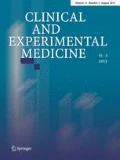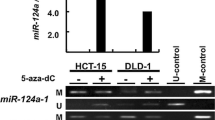Abstract
Tryptase acting at protease-activated receptor 2 (PAR2) contributes to the pathogenesis of Inflammatory bowel diseases (IBDs). DNA methylation has been shown to be an important mechanism in gene silencing. We attempted to clarify the relationship between the promoter methylation of PAR2 and ulcerative colitis (UC). 84 UC patients enrolled in the study. UC patients were classified by disease behavior, severity and extent of disease. For rectal inflammatory mucosal specimens from all the patients, and normal terminal ileum from 23 patients, promoter methylation of PAR2 gene was quantified by digital densitographic analysis following to methylation-specific polymerase chain reaction (MSP). The mean methylation levels of the PAR2 gene in all 84 subjects was 38.4 ± 19.6%. Although mean methylation levels in rectal inflammatory mucosa, and paired normal terminal ileum did not vary, methylation levels of PAR2 gene was significantly higher in total colitis than rectal colitis (total colitis vs. rectal colitis; 42.9 ± 19.6% vs. 34.5 ± 18.9%, P = 0.046). The higher methylation levels were also associated with Steroid-dependent (P = 0.002) and refractory (P = 0.007) UC. Our data suggest that PAR2 methylation status in rectal mucosa correlates with more severe disease phenotypes of UC.



Similar content being viewed by others
References
Raithel M, Winterkamp S, Pacurar A, Ulrich P, Hochberger J, Hahn EG (2001) Release of mast cell tryptase from human colorectal mucosa in inflammatory bowel disease. Scand J Gastroenterol 36:174–179
Cenac N, Coelho AM, Nauyen C, Compton S, Patricia AG, Wallace K (2002) Induction of intestinal inflammation in mouse by activation of protease-activated receptor-2. Am J Pathol 161:1903–1915
Tremaine WJ, Brezezinski A, Katz JA, Wolf DC, Fleming TJ, Mordenti J (2002) Treatment of mildly to moderately active ulcerative colitis with a tryptase inhibitor (APC 2059): an open-label pilot study. Aliment Parmacol Ther 16:407–413
Yamada T, Marshall S, Specian RD, Grisham MB (1992) A comparative analysis of two models of colitis in rats. Gastroenterology 102:1524–1534
Dery O, Corvera CU, Steinhoff M, Bunnett NW (1998) Proteinaseactivated receptors: novel mechanisms of signaling by serine proteases. Am J Physiol 274:C1429–C1452
Schmildlin F, Bunnett NW (2001) Protease-activated receptors: how proteases signal to cells. Curr Opin Pharmacol 1:575–582
Molino M, Barnathan ES, Numerof R, Clark J, Dreyer M, Cumashi A, Hoxie JA, Schechter N, Woolkalis M, Brass LF (1997) Interactions of mast cell tryptase with thrombin receptors and PAR-2. J Biol Chem 272:4043–4049
Molino M, Woolkalis MJ, Reavey-Cantwell J, Praticó D, Andrade-Gordon P, Barnathan ES, Brass LF, Endothelial cell thrombin receptors and PAR-2 (1997) Two protease-activated receptors located in a single cellular environment. J Biol Chem 272:11133–11141
Howells GL, Macey MG, Chinni C, Hou L, Fox MT, Harriott P, Stone SR (1997) Proteinase-activated receptor-2: expression by human neutrophils. J Cell Sci 110:881–887
Bertog M, Letz B, Kong W, Steinhoff M, Higgins MA, Bielfeld-Ackermann A, Frömter E, Bunnett NW, Korbmacher C (1999) Basolateral proteinase-activated receptor (PAR-2) induces chloride secretion in M-1 mouse renal cortical collecting duct cells. J Physiol 521:3–17
Cenac N, Chin AC, Garcia-Villar R, Salvador-Cartier C, Ferrier L, Vergnolle N, Buret AG, Fioramonti J, Bueno L (2004) PAR2 activation alters colonic paracellular permeability in mice via IFN-gamma-dependent and -independent pathways. J Physiol 558:913–925
Kim JA, Choi SC, Yun KJ, Kim DK, Han MK, Seo GS, Yeom JJ, Kim TH, Nah YH, Lee YM (2003) Expression of protease-activated receptor 2 in ulcerative colitis. Inflamm Bowel Dis 9:224–229
Issa JP, Ottaviano YL, Celano P, Hamilton SR, Davidson NE, Baylin SB (1994) Methylation of the oestrogen receptor CpG Island links ageing and neoplasia in human colon. Nat Genet 4:536–540
Ahuja N, Li Q, Mohan AL, Baylin SB, Issa JP (1998) Aging and DNA methylation in colorectal mucosa and cancer. Cancer Res 23:5489–5494
Sato F, Shibata D, Harpaz N, Xu Y, Yin J, Mori Y, Wang S, Olaru A, Deacu E, Selaru FM, Kimos MC, Hytiroglou P, Young J, Leggett B, Gazdar AF, Toyooka S, Abraham JM, Meltzer SJ (2002) Hypermethylation of the p14 (ARF) gene in ulcerative colitis-associated colorectal carcinogenesis. Cancer Res 62:1148–1151
Issa JP, Ahuja N, Toyota M, Bronner MP, Brentnall TA (2001) Accelerated age-related CpG island methylation in ulcerative colitis. Cancer Res 61:3573–3577
Bian YS, Osterheld MC, Fontolliet C, Bosman FT, Benhattar J (2002) p16 inactivation by methylation of the CDKN2A promoter occurs early during neoplastic progression in Barrett’s esophagus. Gastroenterology 122:1113–1121
Wong DJ, Paulson TG, Prevo LJ, Galipeau PC, Longton G, Blount PL, Reid BJ (2001) p16 (INK4a) lesions are common, early abnormalities that undergo clonal expansion in Barrett’s metaplastic epithelium. Cancer Res 61:8284–8289
Kaneto H, Sasaki S, Yamamoto H, Itoh F, Toyota M, Suzuki H, Ozeki I, Iwata N, Ohmura T, Satoh T, Karino Y, Satoh T, Toyota J, Satoh M, Endo T, Omata M, Imai K (2001) Detection of hypermethylation of the p16(INK4A) gene promoter in chronic hepatitis and cirrhosis associated with hepatitis B or C virus. Gut 48:372–377
Podolsky DK (1991) Inflammatory bowel disease 2. N Engl J Med 325:928–937
Langholz E, Munkholm P, Davidsen M, Binder V (1994) Course of ulcerative colitis: analysis of changes in disease activity over years. Gastroenterology 107:3–11
Arisawa T, Tahara T, Shibata T, Nagasaka M, Nakamura M, Kamiya Y, Fujita H, Takagi T, Hasegawa S, Wang FY, Hirata I, Nakano H (2007) Promoter hypomethylation of protease-activated receptor 2 associated with carcinogenesis in the stomach. J Gastroenterol Hepatol 22:943–948
Tahara T, Arisawa T, Shibata T, Wang FY, Nakamura M, Sakata M, Nagasaka M, Takagi T, Kamiya Y, Fujita H, Nakamura M, Hasegawa S, Iwata M, Takahama K, Watanabe M, Hirata I, Nakano H (2007) Risk prediction of gastric cancer by analysis of aberrant DNA methylation in non-neoplastic gastric epithelium. Digestion 75:54–61
Tominaga K, Fujii S, Mukawa K, IchiKawa K, Tomita S, Imai Y, Kanke K, Ono Y, ImuTerano A, Hiraishi H, Fujimori T (2005) Prediction of colorectal neooplasia by quantitative methylation analysis of estrogen receptor gene in non-neoplastis epithelium from patients with ulcerative colitis. Clin Cancer Res 11:8880–8885
Wang FY, Arisawa T, Tahara T, Takahama K, Watanabe M, Hirata I, Nakano H (2008) Aberrant DNA methylation in ulcerative colitis without neoplasia, Hepato-Gestroenterol, (in press)
Velicescu M, Weisenberger DJ, Gonzales FA, Tsai YC, Nguyen CT, Jones PA (2002) Cell division is required for de novo methylation of CpG islands in bladder cancer cells. Cancer Res 62:2378–2384
Song JZ, Stirzaker C, Harrison J, Melki JR, Clark SJ (2002) Hypermethylation trigger of the glutathione-S-transferase gene (GSTP1) in prostate cancer cells. Oncogene 21:1048–1061
De Smet C, Loriot A, Boon T (2004) Promoter-dependent mechanism leading to selective hypomethylation within the 5′ region of gene MAGE-A1 in tumor cells. Mol Cell Biol 24:4781–4790
Ushijima T, Okochi-Takada E (2005) Aberrant methylations in cancer cells: where do they come from? Cancer Sci 96:206–211
Vergnolle N, Hollenberg MD, Sharkey K, Wallace JL (1999) Characterization of the inflammatory response to proteinase-activated receptor-2 (PAR-2)-activating peptides in the rat paw. Br J Pharmacol 127:1083–1090
Vergnolle N, Wallace JL, Bunnett NW, Hollenberg MD (2001) Protease-activated receptors in inflammation, neuronal signaling and pain. Trends Pharmacol Sci 22:146–152
Steinhoff M, Vergnolle N, Young S, Tognetto M, Amadesi S, Ennes H, Trevisani M, Hollenberg MD, Wallace JL, Caughey G, Mitchell S, Williams L, Geppetti P, Mayer E, Bunnett N (2000) Agonists of proteinase-activated receptor 2 induce inflammation by a neurogenic mechanism. Nat Med 6:151–158
Damiano B, Cheung W, Santulli R, Fung-Leung P, Ngo K, Ye R, Darrow A, Derian C, De Garavilla L, Andrade-Gordon P (1999) Cardiovascular responses mediated by proteinase-activated receptor 2 (PAR-2) and thrombin receptor (PAR-1) are distinguished in mice deficient in PAR-2 or PAR-1. J Pharmacol Exp Ther 288:671–678
Hwa J, Ghibaudi L, Williams P, Chintala M, Zhang R, Chatterjee M, Sybertz E (1996) Evidence for the presence of a proteinase-activated receptor distinct from the thrombin receptor in vascular endothelial cells. Circ Res 78:581–588
Vergnolle N (1999) Proteinase-activated receptor-2-activating peptides induce leukocyte rolling, adhesion, and extravasation in vivo. J Immunol 163:5064–5069
Chi L, Li Y, Stehno-Bittel L, Gao J, Morrison DC, Stechschulte DJ, Dileepan KN (2001) Interleukin-6 production by endothelial cells via stimulation of protease-activated receptors is amplified by endotoxin and tumor necrosis factor-alpha. J Interferon Cytokine Res 21:231–240
Cocks TM, Fong B, Chow JM, Anderson GP, Frauman AG, Goldie RG, Henry PJ, Carr MJ, Hamilton JR, Moffatt JD (1999) A protective role for protease-activated receptors in the airways. Nature 398:156–160
Fiorucci S, Mencarelli A, Palazzetti B, Distrutti E, Vergnolle N, Hollenberg MD, Wallace JL, Morelli A, Cirino G (2001) Proteinase-activated receptor 2 is an anti-inflammatory signal for colonic lamina propria lymphocytes in a mouse model of colitis. Proc Natl Acad Sci USA 98:13936–13941
Napoli C, Cicala C, Wallace JL, de Nigris F, Santagada V, Caliendo G, Franconi F, Ignarro LJ, Cirino G (2000) Protease-activated receptor-2 modulates myocardial ischemia-reperfusion injury in the rat heart. Proc Natl Acad Sci USA 97:3678–3683
Conflict of interest
The authors declare that they have no conflict of interest related to the publication of this manuscript.
Author information
Authors and Affiliations
Corresponding author
Rights and permissions
About this article
Cite this article
Tahara, T., Shibata, T., Nakamura, M. et al. Promoter methylation of protease-activated receptor (PAR2) is associated with severe clinical phenotypes of ulcerative colitis (UC). Clin Exp Med 9, 125–130 (2009). https://doi.org/10.1007/s10238-008-0025-x
Received:
Accepted:
Published:
Issue Date:
DOI: https://doi.org/10.1007/s10238-008-0025-x




